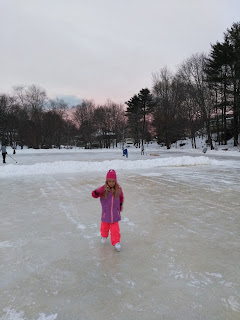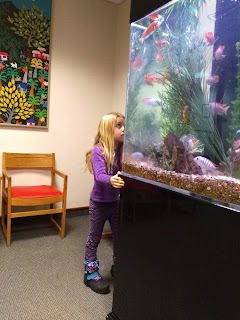Olivia and I were at the airport on our way back to Maine after a fun trip to Colorado. Much to my dad's chagrin I planned to have us arrive one hour and 50 minutes before takeoff. If it were up to him we'd be sitting in the airport "enjoying" ourselves for at least 3 hours! Sorry Dad, it's true ;)
We easily checked our bag at the curbside desk, and the security line seemed to be moving along at a comfortable pace. Still, our shuttle had taken an extra 15 minutes from the hotel, and I was hoping to have time to get something to eat near our gate, so I wasn't totally relaxed about the timing yet. After security we'd have to take the shuttle to the last terminal, too. I wasn't worried, but didn't want anything to delay us. I made sure to have our tablets in their own tray on the security belt, tied my shoes loosely so as to get them on and off quickly, and as instructed by the TSA website, I put Olivia's cold medicine in a separate container and alerted the TSA employee that it was there. All the employees seemed to be in a good mood and were generally cordial if not jovial. Passengers were used to the ever heightened security color of the moment. Things at the airport were good. All of our things went through the scanner without a hitch. Check, check, and check.
But then a TSA employee picked up the medicine bottle and said "I'm just going to run a quick test on these."
Wait, what? Oh great, I thought. Just how long is this quick test going to take? And what could possibly be in the 4 oz medicine bottle? Do you think I'm going to try to blow up a plane with my 6 year old?
Do I look like a terrorist to you?!
"Can you just go ahead and throw those away?" I asked, not wanting to take however long it might take to test them.
But she assured me it would only take a few seconds, so I dutifully removed the lid and she held a strip of paper over the opening, then she instructed me to close it up, pack it up and we were on our way. Easy. 20 seconds max. No big deal. Back on track and on our way to getting a bit to eat at the gate.
It wasn't until the next day that I really got to thinking about the whole thing. And not just the situation, but my reaction to it. Did I really think to myself "do I look like a terrorist to you?" As if in my mind had a terrorist has a "look." As if had I actually had that look, or if anyone had that look, it would be ok to check their medicine bottles. Or pat them down. Or rifle through their belongings that perhaps they had lovingly and carefully packed after a trip to visit Grandma, a much needed vacation away from the stress of work, a visit with a sick loved one, on their way to an important meeting. Was I, or even
am I, thinking that if a person is brown, dressed religiously, looks down or averts eye contact, has an accent, or any other stupid stereotypical appearance, it makes more sense to delay them in the security line? And if I'm
not thinking that, which God please let me
not be thinking that, then what? What makes sense? Should every 15th person be searched? Should everyone with medicine be searched? Should an extra percentage of white people be searched to make up for the prejudices that people of color are faced with?
Every day I am privileged by being white. I am never confronted by my skin color in the mirror, with sideways glances at stores, with people crossing to the other side of the street, with not finding a bandaid to match my skin, with not having cartoons to show my kids that have characters that they can identify with, with my income, with my senators, with the commercials I see, with the lack of fear I live with, with the fact that I don't even think about my race or ethnic background. And sometimes, I'm afraid and ashamed to say, I am hit in the gut with my prejudices. Whether they are intentional or not. Just like that thought I had at the airport. As fleeting as it may have been. "Do I look like a terrorist to you?"
Maybe I see a group of black men, and I hear them laughing together, and I smile over at them, a big silly grin, to show them something. What? That they are cool? That I think they are funny and I like them? That I'm not afraid? That I'm cool? Would I show that same stupid grin to a group of white men? I don't know. When a woman in religious Islamic garb passes by me, do I wave to readily? Do I say hello too enthusiastically? Am I trying too hard to appear like I notice our differences but I'm not bothered? Would I raise my eyebrows and give side-eye to a white teenage boy in sagging pants listening to music too loud yet try to appear like I'm not looking at all at the same boy who happens to be Latino? There was a time when it was trendy to say you don't see color. Everyone is the same. Yet everyone is not the same. The different colors in our world are important and beautiful. How can I live that truth?
My high school was close to a majority of minorities. I had many wonderful friends of different racial and ethnic backgrounds. I have biracial cousins. I minored in Ethnic Studies with an emphasis in African American History. Yet I am white. I am privliged. I will never be able to put myself in the shoes of those considered "other." I loved my minor. I loved my professors, my classmates, the things I learned. It was hard, heart-breaking, discouraging, clarifying, eye-opening. I would immerse myself in cultures of color if I could. I love to absorb the different ways of life. The different ways of expression. The different styles of communicating. I am drawn to Black history and present culture. It's hard to explain and strange to put into words, but my heart sort of constricts when I witness happiness, love, sorrow, everyday living done by people of color. Why is that? In my very bones I long for a world where there are no "isms." Based on race, gender, gender identity, age, class, language. I will never be able to relate to people who experience those injustices. I am one of the most empathetic people I know (which sounds sort of weird to say about myself), and I
want to empathize with the "others" in my life, and in life in general. I don't want them to be called "other". I don't want them to be called "them."
So how do I confront my own privilege? What can I do to make an actual change, big or small? How do I stand behind leaders of color and cheer them on without stepping in and being perceived as the great white hope? What can I do that will get me out of my comfort zone to make things right with those who often don't have a comfort zone? Where do I begin? As overwhelming as these questions might be to me, I can't imagine the overwhelmedness that many or most people of color feel every day trying to live in America. I urge you, if you are a person of privilege reading this post, take note. Take a deep breath. Try to recognize your privilege and at the very least acknowledge it. And if you want to do more, I think a great first step is to read a book written by an author of color. Here are a few suggestions that have had big impacts on me:
Homegoing by Yaa Gyasi
The Hate U Give by Angie Thomas
Between the World and Me by Ta-Nehisi Coates
The Fire This Time by Jesmyn Ward
The Immortal Life of Henrietta Lacks by Rebecca Skloot
(I haven't done research to see how this next book was received by the black community because it is written by a white woman, but it also had a great impact on me in recognizing my privilege:
Small Great Things by Jodi Picoult)
Also, if you are a person of color reading this and you have anything you'd like to say to me, I'm open to it. Let's start a discussion. Teach me. I'm ready to learn.


















































































.JPG)
